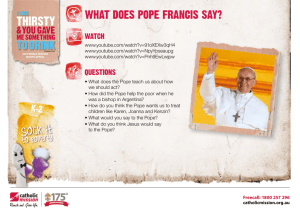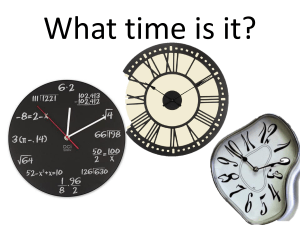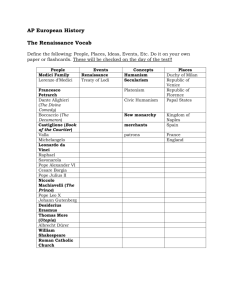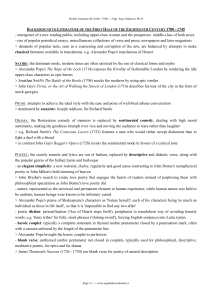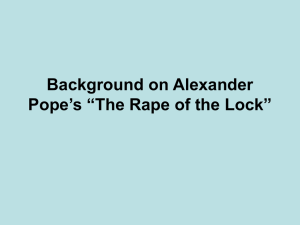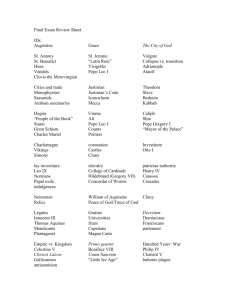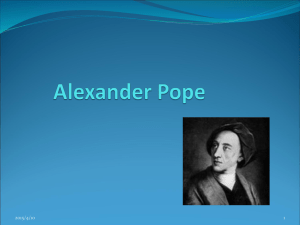- Our Schools
advertisement
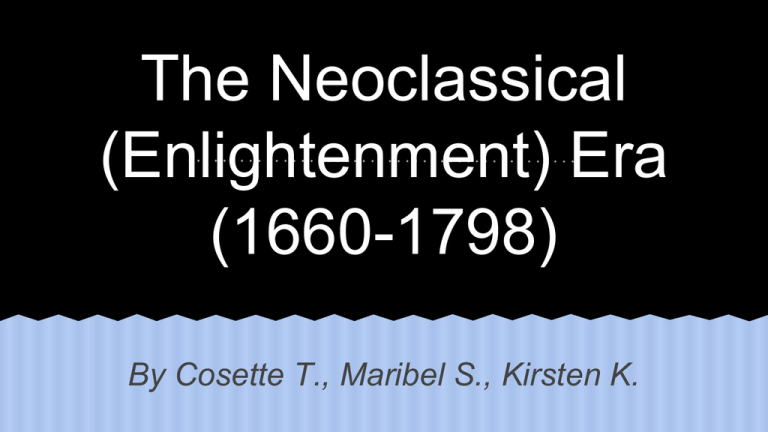
The Neoclassical (Enlightenment) Era (1660-1798) By Cosette T., Maribel S., Kirsten K. The New Restraint ~Mystery and obscurity were considered symptoms of incompetence rather than signs of grandeur. ~A single plot was developed and was strictly limited in time and place. Influence of the Classics ~Writers looked back to the ideals and art forms of classical times, emphasizing even more than their Renaissance predecessors the classical ideals of order and rational control. ~Their respect for the past led them to be conservative both in art and politics. ~No more than their medieval and Renaissance predecessors did neoclassical thinkers share our modern assumption that change means progress. ~They believed that human nature was imperfect. Assumptions and Implications ~They assumed that human nature was constant. ~An individual character was valuable for what he or she revealed of universal human nature. ~Human characteristics were valued over individual differences. ~Artists tried to express old truths in a newly effective way opposed to mimicking the original copy. ~They strived to articulate general truth rather than unique vision,to communicate to others more than to express themselves. Age of Reason ~The common sense of society was emphasized rather than individual imagination. ~Revelation and grace were de-emphasized, and morality consisted of acting rightly to one’s fellow beings on this earth. ~It was to be maintained that the government is was justified not by divine right but by a “social contract” that was broken if the people’s natural rights were not respected. Age of Reason Cont. ~A work of art should be logically organized and should advocate rational norms. ~A person and their society were judged according to their conformity or lack of conformity to Reason, and its ideal. ~They focused on people in their social context,making this perhaps the world’s greatest age of comedy and satire. Major Currents & Developments ~Literacy was on the rise, and novels and periodicals were introduced. ~People emphasized studying the English language. ~Self-examination was important. -The Pope said, “The proper study of mankind is man.” Tenet 1: Order and linear design as important ideals Shift: Freedom in imagination →accuracy and restraint ● Symmetry in art, unity, proportion Sound and Sense By: Alexander Pope In the poem Sound and Sense, Alexander Pope writes about different passions, showing the symmetry of different forms of art. “True ease in writing comes from art, not chance, As those move easiest who have learned to dance. 'Tis not enough no harshness gives offense, The sound must seem an echo to the sense: Soft is the strain when Zephyr gently blows, And the smooth stream in smoother numbers flows; But when loud surges lash the sounding shore, The hoarse, rough verse should like the torrent roar; When Ajax strives some rock's vast weight to throw, The line too labors, and the words move slow; Not so, when swift Camilla scours the plain, Flies o'er the unbending corn, and skims along the main. Hear how Timotheus' varied lays surprise, And bid alternate passions fall and rise!” Tenet 2: Saw man as an imperfect being Shift: Man is fundamentally good → man is inherently sinful and has limited potential ● Kept the idea of man as an important subject of art Paradise Lost Book XI By :John Milton In Paradise lost John Milton writes his poem about how God views man and how man is imperfect. “To show thee what shall come in future days To thee, and to thy offspring: good with bad Expect to hear; supernal grace contending With sinfulness of men; thereby to learn True patience, and to temper joy with fear” Tenet 3: Focus on Historical and Mythological accuracy Shift: Decorative elaboration → exploration of the facts and evidence ● Greek and Roman influences The Hide and the Panther By: John Dryden In The Hide and the Panther John Dryden includes mythological creatures into his poem. “Was Heroe’s make, half humane, half divine. Their earthly mold obnoxious was to fate, Th’ immortal part assum’d immortal state Of these a slaughtered army lay bloud, Their native walk; whose vocal bloud arose And cry’d for pardon on their perjur’d foes; Their fate was fruitful, and the sanguin seed, Endu’d with souls, encreas’d the sacred breed. So Capive Israel multiply’d in chains” Tenet 4: The use of wit Shift: Unique expression → need for sophistication ● Façade of intellect Couplets on Wit By: Alexander Pope In Couplets on Wit Alexander Pope uses wit throughout his poem. “But our Great Turks in wit must reign alone And ill can bear a Brother on the Throne. Wit is like faith by such warm Fools profest Who to be saved by one, must damn the rest. Some who grow dull religious strait commence And gain in morals what they lose in sence. Wits starve as useless to a Common weal While Fools have places purely for their Zea. Now wits gain praise by copying other wits As one Hog lives on what another sh---. Wou'd you your writings to some Palates fit Purged all you verses from the sin of wit For authors now are so conceited grown They praise no works but what are like their own. ” Tenet 5: Importance of self- reflection Shift: Diaries, letters, and essays became more popular ● Power in journalism “On His Blindness” John Milton In “On His Blindness” John Milton self reflects on how he spends his life dealing with his blindness. “When I consider how my light is spent Ere half my days in this dark world and wide, And that one talent which is death to hide Lodg'd with me useless, though my soul more bent To serve therewith my Maker, and present My true account, lest he returning chide, "Doth God exact day-labour, light denied?"” Tenet 6: Importance of balance and restraint Shift: Enjambment and blank verse → endstopped heroic couplet The Temple of Fame By Alexander Pope In the poem The Temple of Fame Alexander Pope writes about the different balances of the earth. “A train of phantoms in wild order rose, And join’d, this intellectual scene compose. I stood, methought, betwixt earth, seas, and skies, The whole Creation open to my eyes; In air self-balanced hung the globe below, Where mountains rise and circling oceans flow; Here naked rocks and empty wastes were seen, There towery cities, and the forests green; Here sailing ships delight the wand’ring eyes, There trees and intermingled temples rise: Now a clear sun the shining scene displays, The transient landscape now in clouds decays.” Tenet 7: A pragmatic view of art Shift: Emotional response → simply intellectual views ● Insight on the morals and ideals of men The Riddle of the World By: Alexander Pope In the poem The Riddle of the World Alexander Pope gives insight into the morals and views of men. “Know then thyself, presume not God to scan The proper study of Mankind is Man. Placed on this isthmus of a middle state, A Being darkly wise, and rudely great: With too much knowledge for the Sceptic side, With too much weakness for the Stoic's pride, He hangs between; in doubt to act, or rest; In doubt to deem himself a God, or Beast; In doubt his mind and body to prefer; Born but to die, and reas'ning but to err; Whether he thinks to little, or too much; Chaos of Thought and Passion, all confus'd; Still by himself, abus'd or disabus'd; Created half to rise and half to fall; Great Lord of all things, yet a prey to all, Sole judge of truth, in endless error hurl'd; Music and Art Examples Bach- Toccata and Fugue in D Minor for organ https://www.youtube.com/watch? v=ipzR9bhei_o Bach - Cello Suite No.1 i-Prelude https://www.youtube.com/watch? v=S6yuR8efotI Jacques-Louis David, Oath of the Horatii, oil on canvas, 1784 (Musée du Louvre)
